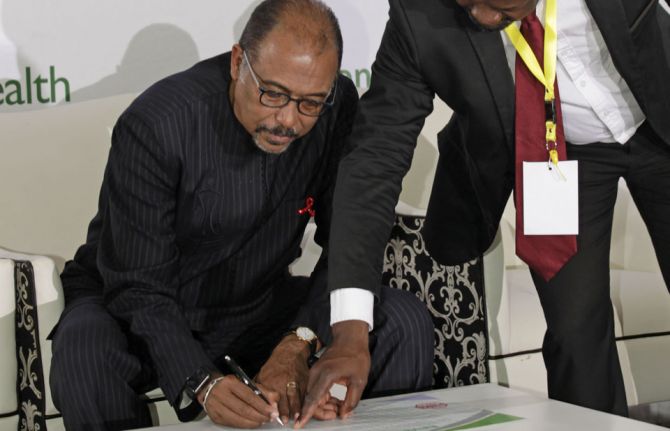

Update
South Africa launches new plan to advance progress towards ending AIDS
03 April 2017
03 April 2017 03 April 2017South Africa has made great strides in its AIDS response—it has the largest HIV treatment programme in the world, with more than 3.3 million people on antiretroviral therapy, funded almost entirely from domestic sources; AIDS-related deaths have declined by more than 55% since 2005; and around 95% of all pregnant women living with HIV in South Africa now have access to medicines to reduce the risk of transmitting HIV to their child.
South Africa is continually striving to do more to stop new HIV infections and prevent AIDS-related deaths and on 31 March launched its third five-year South African National Strategic Plan on HIV, Sexually Transmitted Infections and Tuberculosis (2017–2022). The plan was launched at a special event in Bloemfontein, the judicial capital of South Africa, by Deputy President Cyril Ramaphosa. The Executive Director of UNAIDS, Michel Sidibé, was present at the event to show his support for the new plan.
In the plan are a set of bold and ambitious targets which include reducing new HIV infections from 270 000 to less than 100 000 per year, reducing new tuberculosis (TB) infections from 450 000 to less than 315 000 per year and reaching the 90–90–90 targets—whereby 90% of people living with HIV know their HIV status, 90% of people who know their HIV-positive status are accessing treatment and 90% of people on treatment have suppressed viral loads—by 2020.
To achieve the targets the government and partners will use a combination of high-impact programmes in the locations and among the populations most affected by HIV. The plan also outlines a special focus on HIV prevention among adolescent girls and young women, who have the highest rates of new HIV infections in South Africa—100 000 young women became newly infected in South Africa in 2015.
South Africa is also stepping up its efforts to treat TB. Most AIDS-related deaths in South Africa are due to TB, and in recent years South Africa has experienced a new epidemic of multidrug resistant and extensively-drug resistant TB. As part of plans to dramatically improve adherence and drug resistance issues, the Minister of Health, Aaron Motsoaledi, recently launched a new nine-month drug regimen to treat multidrug resistant TB.
Quotes
“As we launch this third National Strategic Plan, we must remember that in the end it is a plan that belongs to all of us as South Africans. It invites South African leaders from different walks of life to take action to end the epidemics of HIV, tuberculosis and sexually transmitted infections. Defeating the HIV and tuberculosis epidemics is going to rest on all of our shoulders.”
“South Africa is global leader in the AIDS response and has demonstrated that it is possible to go to scale. We can see this in the numbers of people testing for HIV each year, people on HIV treatment and having the right political leadership.”
“We need to ensure that no one is left behind. The national response is about the people. We can’t do this if we don’t involve people. Our actions will count.”
“We need to focus for impact on the districts where the highest HIV burden is. Especially among adolescent girls and young women there are five key things we need to do: keep them HIV-free, keep them in school for longer, eradicate “blessers” through economic empowerment, have zero tolerance for gender-based violence and reduce teenage pregnancies.”



